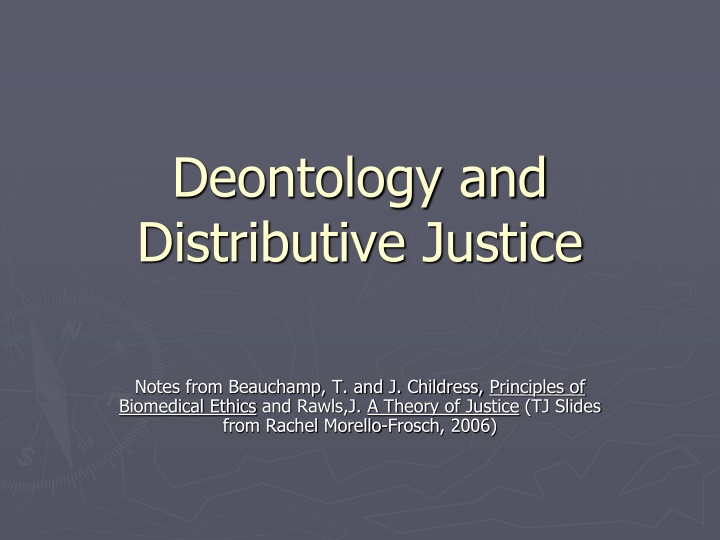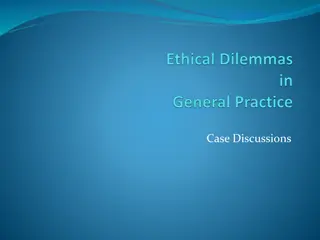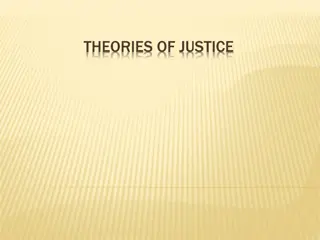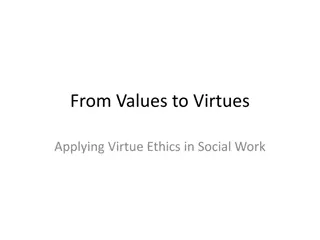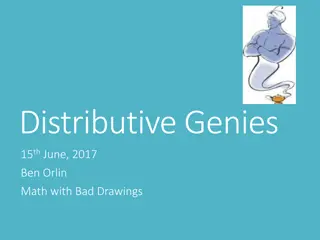Deontology and Distributive Justice in Ethics
Deontology, rooted in the concept of duty, focuses on morally required, forbidden, or permitted choices. It emphasizes obedience to duty, opposing utilitarian claims. Unlike virtue theories, deontology prioritizes what is right over an overall conception of good. Immanuel Kant's categorical imperative is a key principle in deontological ethics, emphasizing universal laws for moral actions.
Download Presentation

Please find below an Image/Link to download the presentation.
The content on the website is provided AS IS for your information and personal use only. It may not be sold, licensed, or shared on other websites without obtaining consent from the author.If you encounter any issues during the download, it is possible that the publisher has removed the file from their server.
You are allowed to download the files provided on this website for personal or commercial use, subject to the condition that they are used lawfully. All files are the property of their respective owners.
The content on the website is provided AS IS for your information and personal use only. It may not be sold, licensed, or shared on other websites without obtaining consent from the author.
E N D
Presentation Transcript
Deontology and Distributive Justice Notes from Beauchamp, T. and J. Childress, Principles of Biomedical Ethics and Rawls,J. A Theory of Justice (TJ Slides from Rachel Morello-Frosch, 2006)
Deontology The word deontology derives from the Greek words for duty (deon) and science (or study) of (logos). Deontology is concerned with choices that are morally required, forbidden, or permitted.
Obedience to Duty Deontology falls within the domain of moral theories that guide and assess our choices of what we ought to do These are deontic theories. For deontological ethical theories, the rightness or wrongness of an actions depends on obedience to a duty.
Deontology Opposes Utilitarianism Deontology opposes utilitarianian claims that the greater gains of some might compensate for the lesser losses of liberty to others. Deontology does not ascribe to the violation of liberty of a few which might be made right by the greater good shared by many.
The Good vs. the Right Deontology doesn t ascribe to an overall conception of the good (teleological telos) for setting moral obligations but instead ascribes to what is right , what is the moral duty.
Deontology is in contrast to virtue theories that guide and assess what kind of person (in terms of character traits) we are and should be.
KANTIAN THEORY The classic exponent of deontological ethics is Immanuel Kant (1724-1804). For Kant, the rightness of the rule or of a proposed moral maxim that constitutes a moral action is determined by whether it satisfies a principle he calls the categorical imperative .
Kants Categorical Imperative: I ought never to act except in such a way that I can so will that my maxim become a universal law .
Judging the Acceptability of a Moral Rule The categorical imperative is a canon of the acceptability of moral rules; a criterion for judging the acceptability of maxims that direct actions. Are we willing to universalize the rule to apply to all cases of the same kind? (Beauchamp and Childress. 2001.p.245)
Kantian Ethics The moral agent must intend what is morally required the moral obligations of truth- telling, or other acts of moral rightness from the requisite good will.
Kantian Ethics Kant s Moral Autonomy the highest good will as a detached condition, free from personal interests, attachments, traditions, beliefs what is right is reasoned from the highest good will!
Deontology Another major categorical imperative from Kant is that I must never treat a person as a means to an end. (Respect for Persons) Persons must be treated with respect and moral dignity to which every person is entitled. They should not be merely or exclusively a means to an end.
Deontological Ethics One s role or sense of integrity has moral weight independent of consequences. Each individual agent s perspective is important in moral deliberation as each agent is morally autonomous. We should not directly cause harm to others.
J. Rawlss Theory of Justice Rawls was considered one of the most important political philosopher of this century 200,000 copies of book sold _ TJ Nominee for National Book Award Work influences multiple disciplines Economics Political Science Sociology Law & Policy (Slides excerpted from R. Morello-Frosch EJ class)
Rawls Distributive Justice J. Rawls work in deontological ethics, particularly distributive justice, deals with the ideals of a social contract for individuals within the state. The right deals with the distribution of goods, how the sum of satisfactions are distributed among individuals.
Deontology does not seek maximizing benefits because of problems of distribution. Deontology seeks justice as fairness; the principle of equal liberty.
Meta-ethical principles Rawl s theory says less about defining what just action is . the primary subject of justice is the basic structure of society, or more exactly, the way in which the major social institutions distribute fundamental rights and duties (TJ, 6)
How do we create a social contract to ensure justice? Rawls proposes the idea of a veil of ignorance. Shrouds those engaging in creation of social contract from basic information about themselves and their interests. Photo by Lafa Pixellutions Christian, Jewish, Muslim, Buddhist, atheist, etc, political activists, community stakeholders.
Defining the Veil of Ignorance No one knows his place in society, his class position or social status, nor does anyone know his fortune in the distribution of natural assets and abilities, his intelligence, strength, and the like (TJ, 11). This prevents parties from exploiting the social contract to gain advantage.
Veil of Ignorance Forces a Maxi-min Strategy for Social Contract Maximizes the minimum outcome A just social contract is one that will protect someone regardless of what their social position is. Photo by Mushin Schilling A logical person would advocate for a social contract that assumes they occupy the worst possible social position
In this way, the veil of ignorance ensures a system that protects those occupying the worst possible position. The lowest rung of society would be higher Inequalities would not be completely abolished by favoring the neediest, but they would be minimized
Theory of Justice in a Nutshell All social primary goods Liberty Opportunity Income Wealth Basis of self-respect Everyone wants these regardless of social position Goods are to be distributed equally unless an unequal distribution of any or all of these goods is to the advantage of the least favored in society. Photo by Andrew Magill
Natural Goods Health and well-being (to be free of pain) Intelligence and talent Imagination Influenced by social structure but not directly under its control
First Principle of Justice Liberty Principle Each person is to have an equal right to the most extensive total system of equal basic liberties compatible with a similar system of liberty for all (TJ, 266). Photo by Arby Reed Includes right to vote, own property, free speech, and political participation Distributed equally among all individuals
Second Principle of Justice Difference & Equal Opportunity Principle Social and economic inequalities are to be arranged so that they are both: a) To the greatest benefit of the least advantaged , and b) Attached to the offices and positions open to all under conditions of fair equality of opportunity (TJ, 266).
Difference Principle Generates the Most Controversy Stipulates that resources must be distributed equally, unless there is a distributional pattern in which the least well off are better off than they would be under conditions of equal distribution. E.g. tax incentives or state subsidies to enhance employment; The New Deal all policies of wealth redistribution
Difference Principle Corrects for a person having greater share of economic resources than s/he deserves Those born wealthy do not deserve advantage from that position Those with talents and natural endowments may have to compensate for this advantage Directly challenges traditional notions of meritocracy, inherited privilege and inherited wealth.
No one deserves his greater natural capacity nor merits a more favorable starting place in society Instead the basic structure can be arranged so that these contingencies work for the good of the least fortunate.
no one gains or loses from his arbitrary place in the distribution of natural assets or his initial position in society without giving or receiving compensating advantages in return (TJ, 87).
Basic Principles of Equality Political Equality Equality of Opportunity Economic Equality Photo by Saxarocks
Critiques of Rawlsian Theory Too much moral subjectivism Notion that there are no objective moral truths Too much universalism Notion that there are universal truths about social justice that apply to any society Too conservative in his recommendations for economic redistribution
Critiques of Rawls Too radical on economic justice and the role of the state in distributional conflicts- foundation for the creation of the welfare state Conception of justice is too narrow Does not address identity issues such as the political status of women and people of color Conception of justice is too individualistic, unlike utilitarianism which focuses on the greater good of a population or group
